The mud has flown around the internet as the US Rowing board resigned, got reinstated, they fired their High performance Director and complaints and demeanours were aired in public.
Whatever governance issues US Rowing has (and we hope they get sorted out), there is a bigger more visible problem. The US Rowing mens team won NO MEDALS at the Rio Olympics. This is a serious low-point.
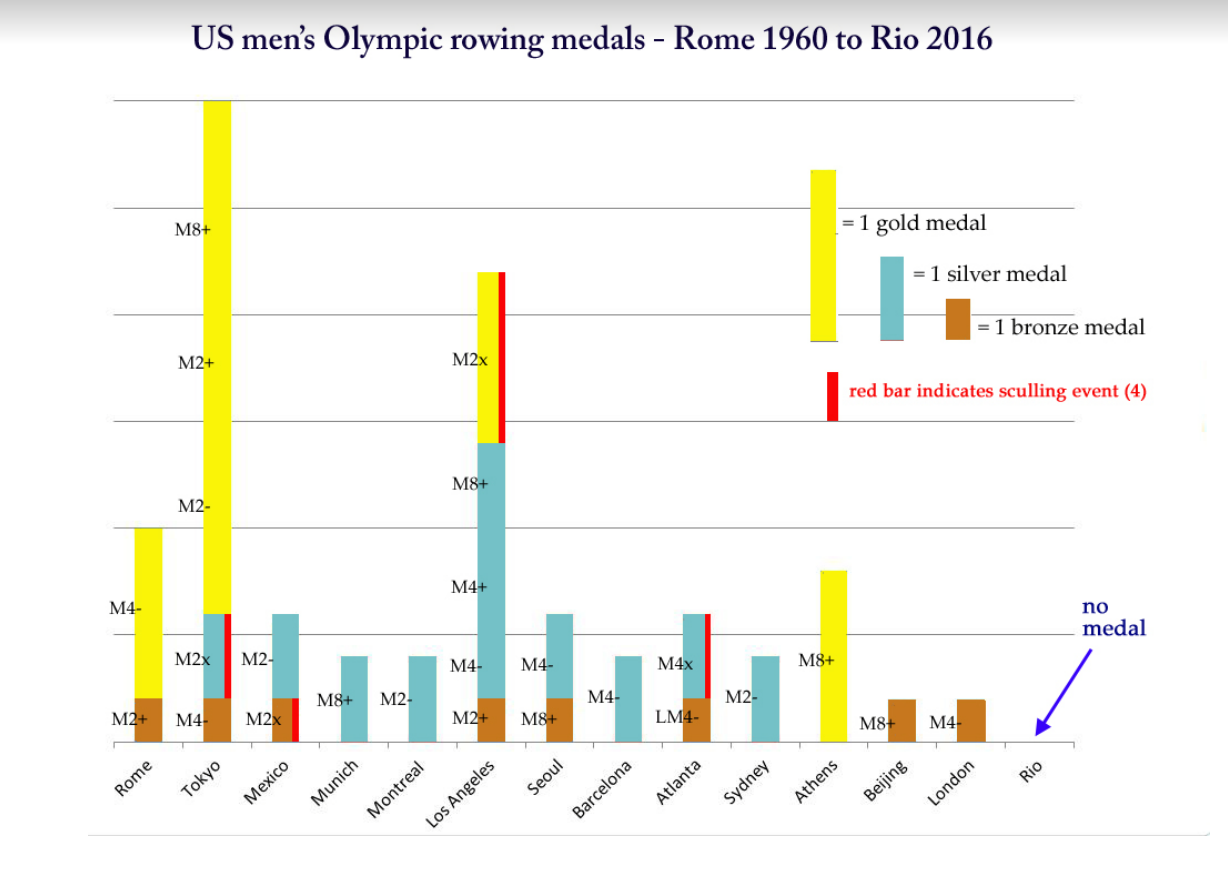

The book is written by Carlos Zezza – who has no axe to grind except that as a supporter of US Rowing he wants to see them winning.
His thesis is this
- The count of mens medals at the Olympics is dropping every 4 years and hit zero in Rio
- USA tends to do well in sweep events
- The IOC is reducing the number of sweep events, therefore US Rowing should start doing well in sculling
- PROBLEM is that no US Universities do sculling races (their national championships only offers sweep events)
- So few Americans are good at sculling and it take too long to learn – athletes retire before they get proficient
- Other countries have been in this place (GB Rowing in 1970s) and recovered, and so US Rowing can recover
- But change is needed
- The changes he sets out are 1) sculling 2) fewer foreigners in the US universities top crews 3) a strategic plan
Read the Boys in The Box for yourself.
Page 73 gives contact details for the author and how to send him suggestions.
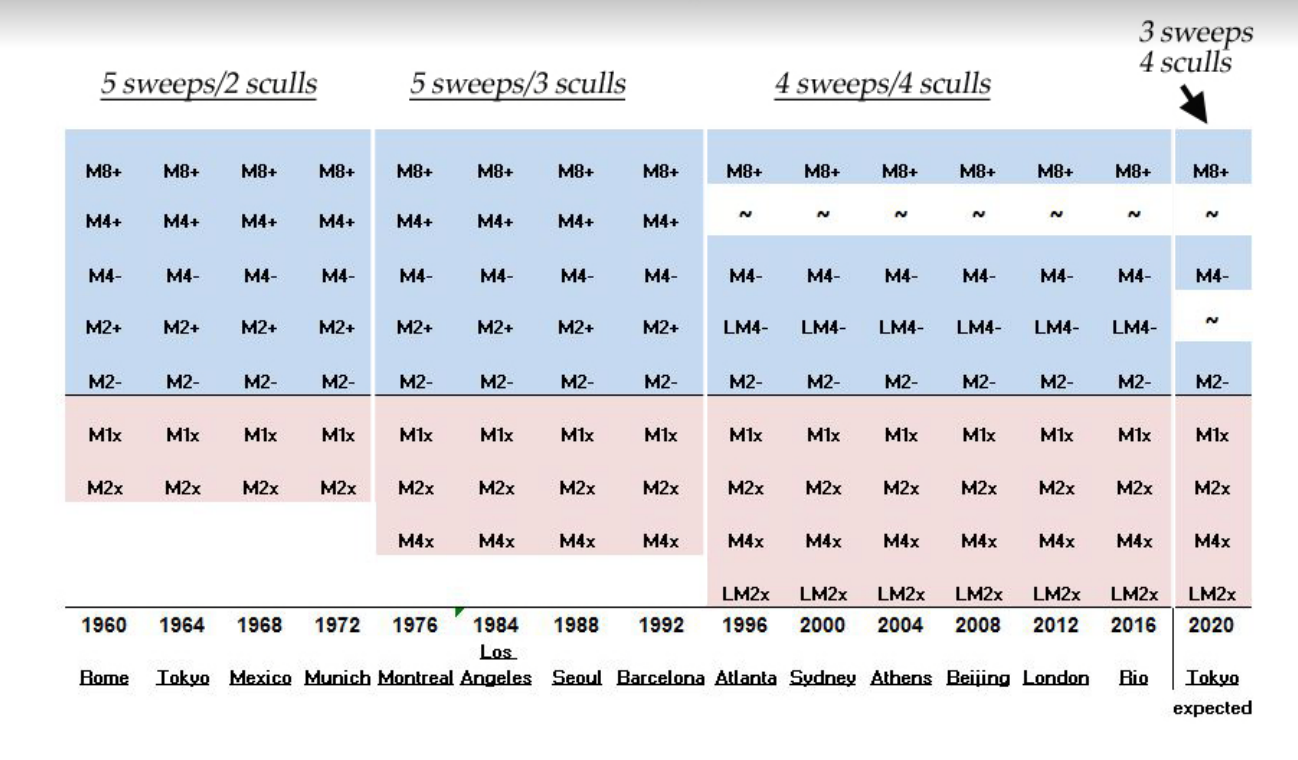

A nice comparison graph with the British Rowing “drought” of Olympic medals and their recovery – which took 3 Oympiads to get a gold medal again .
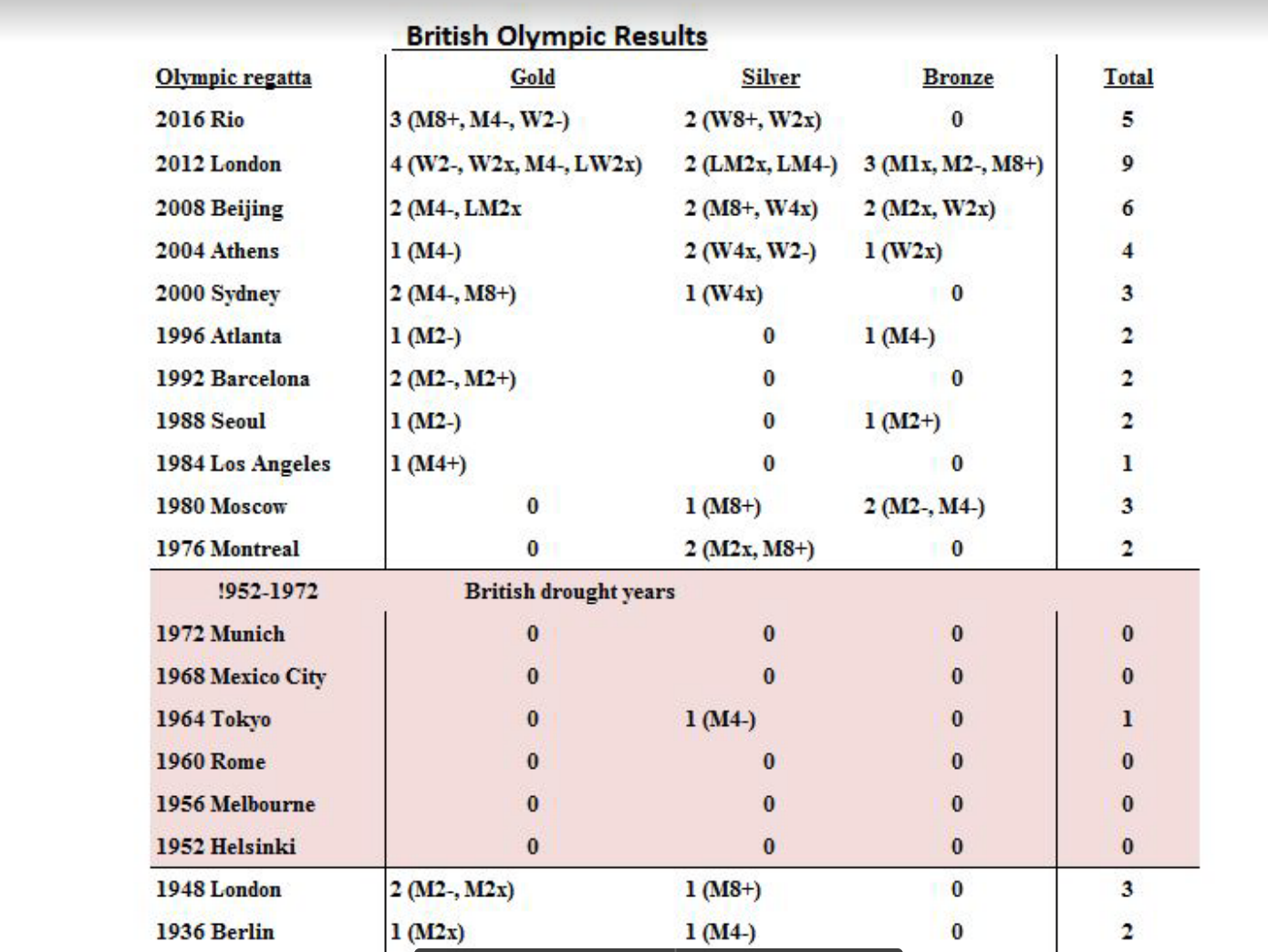

[Another large issue is that each athlete is paid $1,300 a month. For the 12 rowers at Princeton, that is a total of $186,000. Or slightly less than one of the three men’s coaches wages!! With two coaches at $190,000 each to coach just 6 rowers , one can understand the frustration of the athletes. Add to that the High Performance Director, hired specifically to assist the dearth of men’s performance, then is another $160,000 layered on top.]
Extracts from The Boys In the Box
As a practical matter, our elite rowers need enough money to train full time and be able to make ends meet. (p28)
Clear path – no competing goals
Coaches elsewhere see themselves as part of a national development process aimed at international success. To quote from the Germans, “Nur gemeinsam sind wir schlagkraftig” (“Only together are we powerful”)
This contrasts with the USA. In the USA, scholastic and collegiate regattas define coaches’ and athletes’ success. Regional school competition may conflict with national junior regattas. College rowers need to complete their sweeps season before turning to national selections.
p32 mentions the big versus small boat experience
Because most of our young rowers row in big boats where technique is hard to appreciate, erg scores are often taken as a proxy for potential speed on the water. Maybe for this reason, American crews are sometimes criticized for poor technique compared to overseas rivals.
p33 Putting the best rowers in the smaller boats [as practiced in Europe] is 180 degrees opposite from historical USA practice, where the best rowers are seated in eights.
p35 But a shift to favor small boat competition, with a team point structure to encourage putting the best rowers into the smaller boats, would change the picture.
Can we wait for the best college rowers to graduate before we prepare them to compete in the international boat classes? As noted in Chapter Three, it is most likely too late.
p45 Offers a solution for domestic competition. To fulfill its obligations as NGB, USRowing needs to address the entire talent development process from initiation, with standards to measure progress at each level. USRowing needs to influence, as best it can, talent development outside its control.
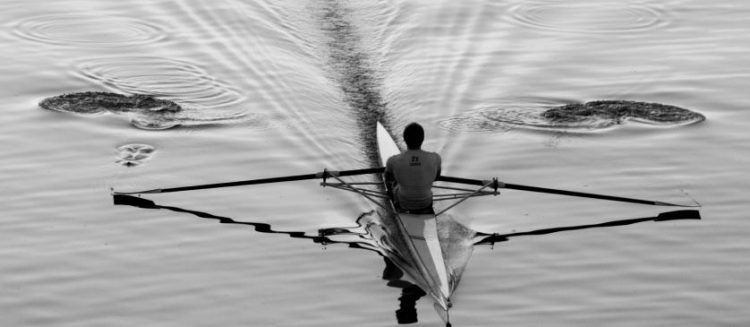





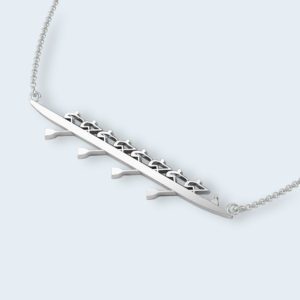

This Post Has 9 Comments
Could it be that the best women athletes row in the US and play soccer in Europe, while the best men play football, basketball,
Baseball, golf, rugby and rarely row? Nott really a small boat large boat issue.
Interesting. NCRA success (25 Henley medals in 25 years, not to mention the international successes) was founded upon sculling. Everybody proved themselves sculling even though they might be selected for sweep crews. You learn nothing about boat moving in an 8 or on an ergo, especially non-dynamic ones. I’ve had a rowperfect since the turn of the millenium and I swear by it but nevertheless I hardly use it because I have a river flowing outside my window and it’s a short walk to my boat.
There are geographical and structural issues, and I believe there is an answer to both, but it is not easy. The geographical issue is that rowing centers and good rowing water in the US are very far apart, which limits the amount of competition to those in the immediate neighborhood, for cost and time reasons. The answer to this is greater depth in each rowing area.
The structural problem is that sport in the US, and not just rowing, is very much inter-scholastic. That means the best coaches all work for university programs, with the wealthy colleges and universities with rowing traditions get the best coaches. The success of those programs is judged on their interscholastic results. When was the last time there was a club at the EARC Sprints or the IRAs? Those coaches get the best talent they can find, and a US university education is a big drawing card – gain fluency in English and get a first class degree while enjoying your favorite sport. Until the grip of universities is broken, this will remain the case, and I can’t see that happening soon.
Just by the way, with sport so heavily interscholastic, it is hardly surprising that US sport loses so many of their participants abruptly at age 22. That especially hurts rowing, since rowers reach their best in their late 20s,
The answer is more clubs to build the junior scene and the depth of local participation. The added benefit is that young athletes are not just competing with and against their contemporaries, but in addition working alongside adults, just as they will be in real life.
Outside Sean’s timeline, I remember having it pointed out to me in the 60s that the US won every single Olympic gold medal in the VIIIs until 1960, when Karl Adam’s VIII beat Navy. Those were all undergraduate crews, when the US had food and wealth. By 1960 the others had got organised and properly fed, and had programs peopled by adults rather than schoolboys. The US won again in 1964, when they had a crew from Vesper with more mature athletes. After that it has been slim pickings.
The British story is different in some ways, and social issues (some of which were evident in ‘The Boys in the Boat’, played a very big part.
Fred – thanks for this. You are the first respondent I’ve had who has suggested solutions – which is really constructive. Does your club have a juniors program?
Other problems not addressed but should be: college coaches lying to recruits to get them to commit then leaving before the athlete shows up. They know full well they are looking but don’t mention it. NO accountability on their part. Also, coxswains should unionize for better treatment and it seems that the only ones who are heavily favored are from U Wash. Too bad US coxswains cant compete for Britain! I would tell them to go there. Ditto for minority coxswains and rowers
Thanks for adding this – but surely there’s no guarantee an individual coach will be on a program when you join it? Why shouldn’t they advance their career? Surely you don’t pick your University only on one coach being there?
What about a better tracking system? British Rowing has a data base that it’s member clubs and coaches input their team information into. Tracking each and every athlete starting at the junior level. If done properly, it could also be used to broaden and develop better coaching skills from the top down. National coaches could access and identify athletes starting at a young age. Allow for video feeds, etc. Seems like a good way to streamline several issues and simplify the identity of education and athlete development.
Ms. Caroe:
There are, to me, glaring omissions in rowing programs and adjunct weight training programs. I was an outstanding lightweight decades back, but dropped out of rowing after university. I figured what I knew would soon be common knowledge, yet 40 years later, the sport has gravitated in theory away from some technique points that even other international crews lack. I get shouted down by various “experts”. I did have an interesting exchange years back with Dick Dreissegacker of Concept2. His main reply was that no one knows how to teach what I advocated. Seems if I could describe it, I should be able to teach it. Which I have done on a very small scale with a few friends and my daughters.
Drew Ginn of Australia experimented with one point to his advantage. The Brit 8 in Rio clobbered everyone mainly with reduced stern check. But they still have not mastered what I learned 45 years ago, and I think was a secret of the great UW boats of the first half of the last century.
Americans rely on erg training, so swing is unheard of, physics is denied. One can not cancel physics with brute strength, short strokes, and lack of technique, though they have been trying.
My college coach said I had really mastered rowing, though everyone else thought I rowed weird. His words were actually that in reference to me, “He has perfect technique”. I still row that way, as best I can without coaching. I have had other coaches tell me as much, or simply stare as I row a double with my daughter. With swing, without stern check, maximizing total boat speed. But just for fun.
You have intrigued me and I want to understand more. Can you describe or better still, video what you teach? Others will want to learn it (maybe outside US Rowing).